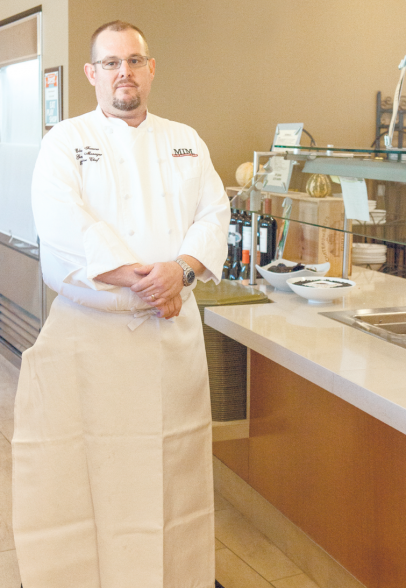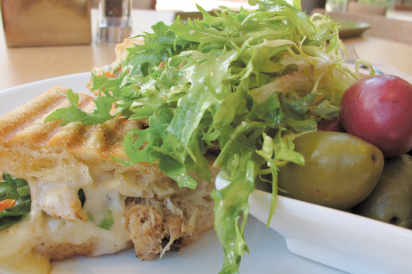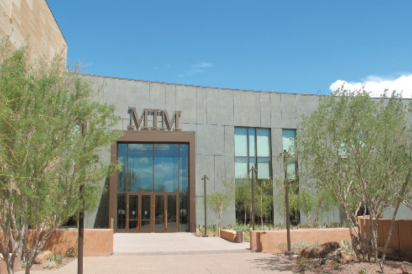Museum Quality: The Cafe at MIM
Chefs sometimes jump on the "buy local" bandwagon because it's trendy. They want to print local farmers' names on their menu because it sounds like the right thing to do – and it attracts attention from customers and the media.
It doesn't take long, however, to figure out that sourcing a significant chunk of the menu locally isn't easy, nor does it seem as cost effective, at least on the surface, as buying everything from a one-stop food distributor. After an initial trial of buying local, some chefs give up and go back to the way they've done business before. For other chefs who stick with it, buying local becomes business as usual.
For chefs like Edward Farrow of the Café at MIM, business as usual goes beyond dealing with multiple farmers with multiple personalities showing up on given days with whatever came out of the ground unscathed that day. For Farrow, business as usual also means driving all over the state on his day off looking for farmers, ranchers, growers and producers who are driven by the same principle he is: passion for their craft. Along the way, he's met some colorful characters and strengthened his own commitment to sourcing locally.
Part of the MIM Café's local focus is driven by the Bon Appétit Management Company (BAMCO), which operates the café under contract for the Musical Instrument Museum (MIM). The innovative California-based food services company is known for turning the traditional corporate contract food services business model upside down. Both the International Association of Culinary Professionals (IACP) and the James Beard Foundation have bestowed awards on BAMCO founder Fedele Bauccio. Instead of hiring kitchen managers who purchase #10 cans and reheat frozen foods, BAMCO hires professional chefs and directs them to cook from scratch, while giving them leeway to treat their outlet as if it were their own.
"That's the great thing about BAMCO," Farrow says. "It's not a cookie-cutter formula. Each place is its own entity."
In 1999, BAMCO started the Farm-to-Fork program, encouraging their chef-run outlets to seek out local farmers and producers. In fact, BAMCO has a baseline requirement that each outlet purchase 20% of foodstuffs from local suppliers. Farrow knew he could easily surpass that goal when BAMCO wooed him away from his sous-chef position at Kai – Arizona's only Five Star and Five Diamond restaurant – to open the cafe at the museum two years ago. He'd already developed solid relationships with several local farmers, and was a firm believer that buying local meant buying more flavor. What he didn't know then was how far above the baseline he would go.
The posted daily menu at the café reads like a Who's Who of local farmers, ranchers and producers. Some names, such as Desert Springs or Reevis Mountain Ranch, may not be familiar, but each one is part of Farrow's growing local network, and combined, they've helped him reach a 75% local sourcing level – the highest in the BAMCO family of 400 locations in 32 states.
The Accidental Chef
You won't hear Farrow tootin' his horn about it. He's not that kind of guy. You could say Farrow is the accidental chef. Six feet tall, with short-cropped hair, metal-rimmed glasses and always dressed in a crisp, clean white chef 's coat, 49-year-old Farrow is the epitome of professionalism. He is a quiet force, but speaks with confidence from years of experience. He doesn't seek the limelight, though he has worked for several chefs who have.
While studying business administration in the 1980s, this second-generation Phoenician walked into a kitchen at San Diego University to help a friend out when none of the dishwashers showed up – and he's never left the kitchen since.
"I was a well-educated dishwasher, much to my parents' chagrin," Farrow laughs.
He stumbled into his second culinary position when he was mistaken for a job applicant while waiting on a friend to pick up a paycheck at a touristy fish house. Farrow stayed a year and a half before the chef persuaded him to enroll in culinary school. He graduated from the Culinary Institute of America (CIA) at Hyde Park, New York, eventually working at The River Cafe under David Burke, a restaurant the New York Times has labeled "The Restaurant That Launched a Thousand Chefs."
Farrow's pedigree also includes working for Patrick O'Connell at The Inn at Little Washington, for Alex Stratta (Mary Elaine's in Phoenix, Stratta in Las Vegas, Bigoli in NYC), and for James Beard Award winner and local chef Christopher Gross.
"He was very serious and did a great job," Gross says of Farrow, adding "he helped make my job easy and I was sad when he left."
Farrow says Gross was a great chef to work for, but wasn't one to suffer fools. "I like Christopher as a person," Farrow says, "and I love his cooking. He may be the best chef in town. Still. He's had a long run. Not many can do that."
Local Isn't New
Buying local may be a buzzword to some, but for Farrow it's common sense. The food he buys from locals just plain tastes better. And, he says, the produce stays fresher longer than something that was shipped in, even from California.
"When you compare dollar for dollar, local might not look as good on an invoice," he says. "But factor in shelf life, how little I have to manipulate it to make it taste good, and it's a whole different story."
He says his first light bulb moment about the term "local" came while he was at The Inn at Little Washington.
"The Inn was – and is – all about Virginia cuisine, very region-specific, not just Southern cuisine," he says, "And they had a huge garden out back. I was like, 'Oh, you can grown your own food, right here outside the kitchen door.' "
During Farrow's stint at Kai in Chandler, a grower wandered in one day with a box filled with tomatoes and Italian zucchini. Farrow and the team were so impressed they made a trip to Seacat Gardens' one-acre plot to get to know grower Carl Seacat. They brought lunch, got their hands dirty, planted tomatoes and bonded.
When Farrow was building his menu for MIM Cafe, Seacat was one of the first growers he called. Farrow bought – and still buys – as much as Seacat can grow for him.
"I think you can taste the passion in his produce," Farrow says. "There's just an extra bit of flavor explosion there. It's not just the seeds or the dirt, it's how he takes care of his vegetables."
Hiding in Plain Sight
Farrow speaks about local suppliers with reverence. He calls them by their first names, knows their families and has visited every single one of them to see how they run their businesses. He invites them to eat at the cafe to see what he does with their products, and is proud when they show that spark of wonderment after eating his – their – meal.
Word gets around and some producers contact Farrow, but he's found a number of new suppliers by getting out to other areas of the state. Last summer, he drove to Globe to purchase a local soda not distributed in the Valley, and while he was there, he stopped at the Globe farmers' market. He discovered the owners of Reevis Mountain Ranch and "tasted their amazing pears and persimmons from their 100-year-old orchard." They introduced Farrow to another grower, a shy man who grows Jerusalem artichokes and strawberries.
"He doesn't like to come off the mountain," Farrow says. "So I go to him."
Farrow found Desert Springs, a tilapia farm near Yuma, and spent weeks convincing the farmer that he was the real deal, that he would be a steady customer. After getting rebuked on the phone, Farrow got in his car and drove to western Arizona to prove that he was serious about wanting to buy the tilapia.
Farrow says many suppliers get burned by restaurants or resorts that want to only order once, or those that think they want to buy local but then can't deal with the realties of what that could mean in terms of product availability and consistency. It's not easy committing to many (growers/farmers/producers) vs. one (one-stop food distribution companies). But it is something that Farrow believes in.
"He's as locavore as locavore gets," says Seacat. "Growing produce is dicey. You can have fabulous successes and you can have spectacular disasters. Edward takes what I have and unfailingly supports me and other local producers through thick and thin. That's as rare as it gets."
"It's funny," Farrow says, "Carl is as passionate about what he does as we are about what we do. The big produce houses, they serve their market and they do a good job, but it's not live-or-die for them. For Carl, it is. For me, it is. For all the others, it is. It's what we do. We're not doing it for the money. We're certainly not in it for the short hours. We do it because it's what we love. It's in our DNA."
Suppliers
A partial list of The Café at MIM suppliers:
Crooked Sky Farms
Crow’s Dairy
Desert Springs
Fossil Creek Farms
Maya’s Farm
Mrs. Klein’s Pickle Company
The Meat Shop
Power Ranch
Rainbow Valley Heritage Foods
Reevis Mountain Ranch
Seacat Gardens
Two Wash Ranch
The Café at MIM
You don't need to buy a ticket to the museum to eat in the café, but be aware of the café's limited hours: 11am to 2pm daily.
The menu changes daily, based on what's available from Farrow's suppliers. Here's a sample of a few menu descriptions:
• Josh's Foraging Fowls chicken salad over local lettuces, Maya's Farm vegetables, Crooked Sky Farm potatoes, Crow's Dairy goat cheese
• Seacat Gardens' heirloom tomato soup with chick¬peas, Parmesan cheese, local greens and crema
• Power Ranch grass-fed beef hamburger or Schreiner's all-beef hot dog
• Local herb-garlic roasted turkey breast, Rainbow Valley cheese curds, organic lettuces, Maya's Farm Toscana kale on MJ's multi-grain bread
Also keep an eye out for the special menus Chef Farrow creates to accompany visiting exhibits.
BAMCO
Bon Appétit Management Company, which operates the Café at MIM, provides café and catering services to corporations, colleges and universities and specialty venues. See Bamco.com for general information on the company and cafebonappetit.com for specific information on their café concept and the menu for The Café at MIM.








